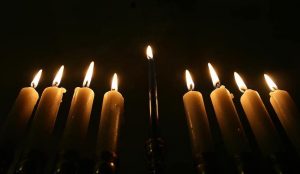Flames Unseen

“If Christians knew the effect of church bells on the Jewish soul, they would ring them all day long.” –Rav Yisrael Salanter, 19th century
December was the beautiful season. Twinkling lights and golden bells, red and green and mistletoe. Storefronts with presents, piled high, dolls and toys and spinning tops. Angels and reindeer, ribbons and wreaths, trees all bedecked with golden stars.
Silent night, holy night. The singers are calling. A landscape of sugar, crystal white, and ice laden down with peace on earth. Joy to the world! Good will towards man! Carols ringing through the falling snow, steeples soaring in the cold black air. A shining wonderland in her eyes.
No one said it wasn’t hers, all this, that her heart loved.
*
Into this white picture, shattering peace on earth, one day there strode a Jewish child.
This is Mark, said Miss Jensen, from the sixth grade. Mark is visiting all the classrooms today to tell us about Hanukah. Does anyone know what Hanukah is?
One hand shot up. That’s what Jews celebrate instead of Xmas.
Good, Steve. And Mark’s father, said Miss Jensen, is Rabbi G—-, of Temple Emmanuel in Norwalk. Does anyone know what a rabbi is?
No hands this time.
Rabbis are Jewish ministers. And does anyone know what a Temple is?
That’s where Jews go to church, said Claire.
In my class at school, there weren’t any Jews, except me. And now this boy, the Reform rabbi’s son–didn’t appear to be embarrassed, standing in front of my class, talking differently from everyone else, and looking different. In those years after the Holocaust, of what was I ashamed, and ashamed of my shame? What was I scared of? An unseen Covenant held me against my will.
I sat at my desk, sinking into the floor.
Mark held up a multi-pronged brass candlestick. This is a menorah, he said, and he told us what it meant. His speech didn’t remain with me. All that endured was a little flame of shame, fed from some unseen inner blaze.
I wanted to belong, with Kathy and Mary and Bambi.
Thank you very much, Mark, said Miss Jensen, for telling the class about your holiday.
*
To enter my 40th high school reunion, held in the country club, was to walk into a costume party—all the kids whom I loved, dressed up like middle-aged characters in the class play, with lines on their faces. Donna was there, and Linda, and Steve. Bambi and Norm, Doug, and Claire, and Dave. Mark, two years older, wasn’t in attendance; I’d heard years before that he’d married a Catholic and settled in Colorado.
On the program, I was listed as “Classmate Who Traveled the Farthest to Get Here, All the Way from Israel!” and “Classmate Who Has the Most Children!” (The number wouldn’t have impressed them in Bnei Brak.) “Tell us what it’s like living in Israel,” my childhood friends entreated, with genuine respect in their eyes, and curiosity. “Do you like it?”
Suddenly I was the most popular girl in school.
It was time for Show and Tell:
One morning I couldn’t hold myself back; I had to see the site of the most recent suicide bombing. Some American teenagers had been hurt at an ice cream shop, one of whom, the Jerusalem Post reported, had lost his legs and his arms.
It had been a month or so since I’d last been foolhardy enough to board a bus. Some instinct drove me to it now; a nonverbal understanding that it was urgently necessary to confront this. Something demanded it of me—that it was the right thing to do.
Getting off in the center of town, I was shocked. I was terrified. Silent devastation was everywhere. Wandering pedestrians here and there, like ghosts in a ghost-town. I wanted a cup of coffee, but all the coffee shops had shut their doors! The restaurants, the stores, all dark.
“In the gates of Zion,” the prophet Isaiah had foretold, “she who sits desolate, lamenting on the ground.”
Glass crackled under my feet as I approached the cordoned-off site at Zion Square, and there I stood, and stared. Spattered blood on the buildings!
Speechless, I turned away, whereupon something in the shattered glass storefront of a tourists’ souvenir shop caught my eye. There, on a shelf covered completely with smashed and broken glass, stood one little eight-pronged, silver-plated brass menorah.
We would survive!


“If Christians knew the effect of church bells on the Jewish soul, they would ring them all day long.”
–Rav Yisrael Salanter, 19th century
Baruch Hashem, relations between Jews and Christians are such that this is no longer the case! Church bells do not cause me harm in the slightest, nor should they anyone else.
As Rav Hirsch put it in 1858 (!):
“A spark from it [the Jewish spirit] has lit up the hearts of heathens through Christianity, and it brings joy to people through that which is known as Christian love and charity. Yes, the Jewish boy must even rejoice over the depiction of a Christmas Eve, which is, rightfully so, rarely missing in any reading book for Christian
youth!”
Fascinating story ( full disclosure I have a similar l anniversary coming up and a classmate who called me was very ignorant re kashrut let alone my reluctance to go to a bar for drinks) I think that many BTs would certainly send regards to their classmates but would have some Halachic and hashkafic reservations about going to a country club or bar to get together with people whose lives were markedly different in lifestyle I am not sure that Kavod HaBriyos or Hakaras Hatov requires you to be an element of sociological and Intellectual display for people that you haven’t seen or been in contact with 40 or more years and who may have and still choosing a life of Torah observance with thinly veiled contempt or worse